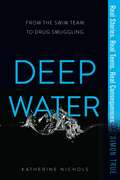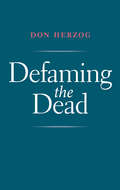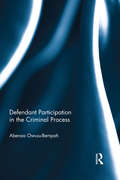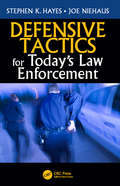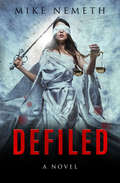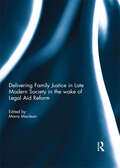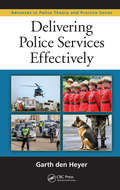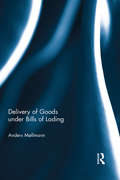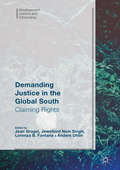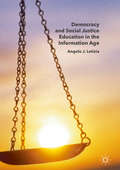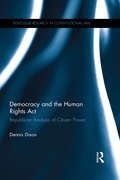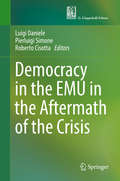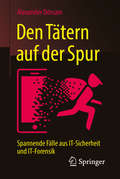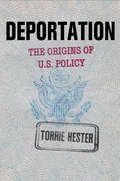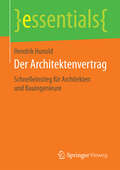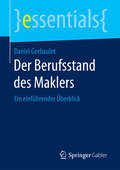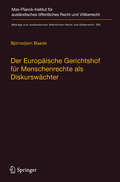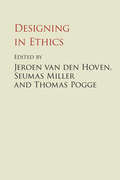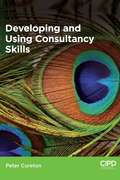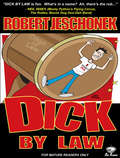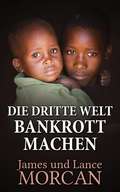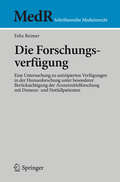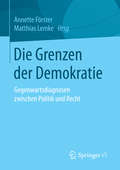- Table View
- List View
Deep Water (Simon True #1)
by Katherine NicholsReal stories. Real teens. Real crimes. A group of teens traffic drugs between Mexico and California in this start to the brand-new Simon True series.It&’s 1971 in Coronado, a small southern California beach town. For seventeen-year-old Eddie Otero, a skilled waterman and avid surfer, life is simple. Then a friend makes him an offer: Swim an illicit package across the border from Mexico. The intense workout is dangerous. Thrilling. Lucrative. And the beginning of a small business. When the young entrepreneurs involve their former high school Spanish teacher, the smuggling adventure grows into a one hundred million dollar global operation. Soon they become fugitives. Living on the edge, they vow to return to their normal lives—right after one last run…
Defaming the Dead
by Don HerzogDo the dead have rights? In a persuasive argument, Don Herzog makes the case that the deceased's interests should be protected This is a delightfully deceptive works that start out with a simple, seemingly arcane question--can you libel or slander the dead?--and develops it outward, tackling larger and larger implications, until it ends up straddling the borders between law, culture, philosophy, and the meaning of life. A full answer to this question requires legal scholar Don Herzog to consider what tort law is actually designed to protect, what differences death makes--and what differences it doesn't--and why we value what we value. Herzog is one of those rare scholarly writers who can make the most abstract argument compelling and entertaining.
Defendant Participation in the Criminal Process
by Abenaa Owusu- BempahRequirements for the defendant to actively participate in the English criminal process have been increasing in recent years such that the defendant can now be penalised for their non-cooperation. This book explores the changes to the defendant’s role as a participant in the criminal process and the ramifications of penalising a defendant’s non-cooperation, particularly its effect on the adversarial system. The book develops a normative theory which proposes that the criminal process should operate as a mechanism for calling the state to account for its accusations and request for official condemnation and punishment of the accused. It goes on to examine the limitations placed on the privilege against self-incrimination, the curtailment of the right to silence, and the defendant’s duty to disclose the details of his or her case prior to trial. The book shows that, by placing participatory requirements on defendants and penalising them for their non-cooperation, a system of obligatory participation has developed. This development is the consequence of pursuing efficient fact-finding with little regard for principles of fairness or the rights of the defendant.
Defense Perspectives on International Criminal Justice
by Gentian Zyberi Colleen RohanThis examination of the role of the defence in international criminal proceedings highlights it's contribution to the development of international criminal law and the fair administration of international criminal justice. Written by leading international practitioners and scholars, it combines the practice and theory of international criminal law in order to provide a first-hand perspective on the challenges involved in the good administration of international criminal justice. The authors examine, among other issues, the role of the defence during the different stages of international criminal proceedings, the key aspects of defence work which ensure the right of the accused to a fair trial, professional ethics, the United Nations Residual Mechanism for International Tribunals, and post-conviction remedies and issues relating to those serving prison sentences.
Defensive Tactics for Today’s Law Enforcement
by Stephen K. Hayes Joe NiehausFew of the many defensive tactics books on the market include the training and methods of martial arts. Drawing on the centuries-old techniques of Ninjutsu, Defensive Tactics for Today’s Law Enforcement offers alternatives to the traditional police defensive tactics taught to most officers. This text stresses relying on natural tendencies in a violent encounter to ensure officer safety and to better utilize the techniques and training officers do receive. By integrating existing training with martial arts expertise, Defensive Tactics provides officers access a full complement of techniques to better navigate physical conflict safely and effectively. Intended for law enforcement practitioners, as well as practitioners of any other professions that present a personal security risk, Defensive Tactics for Today’s Law Enforcement will better equip readers with a diverse range of defensive tactics.
Defiled: A Novel
by Mike NemethNemeth &“knows how to build suspense&” is this legal thriller about a bitter divorce that takes a frightening twist (Publishers Weekly). Florida entrepreneur Randle Marks has just been served with divorce papers by his wife Carrie. It&’s not a shock. Conniving, loveless, and adulterous, she&’s more of a threat. Randall&’s new startup is about to go global, and the millions he&’ll rack up will be fair game. He needs a master manipulator on his side—someone like attorney Tony Zambrana who&’s already devising a cunning strategy to outwit the voracious soon-to-be divorcée. But Carrie has more on her side than Randle can imagine: outdated laws, shady judges, a dogged detective, and a cutthroat publicity-hungry prosecutor. Not to mention Carrie&’s capricious twin sister, and the greedy officers of the court who are more than willing to pit one bull against the other. To win at this increasingly brutal contest, Randle agrees to become the bait in an elaborate and dangerous trap. But for both Carrie and Randle, the cost of losing could be their very lives.
Delaware Driver Manual: First Class Service from the First State
by Delaware Division of Motor VehiclesThis manual gives you information on safe driving rules and practices to help you become a safe driver. Be sure to read the manual carefully. Unless you know the information in this manual, you cannot pass our knowledge tests. This manual attempts to cover the major elements of Delaware law; however, it cannot cover all parts of federal or State law. If a conflict exists, then the actual code or legislation will always take precedence.
Delivering Family Justice in Late Modern Society in the wake of Legal Aid Reform
by Mavis MacleanLegal aid for family cases in private law, mainly divorce and separation, where the state is not directly involved as it is in public law cases where there are issues of domestic violence or neglect or abuse of children, came to an abrupt end together with help for welfare and immigration cases on April 1 2013 when the Legal Aid Sentencing and Punishment of Offenders Act (LASPO) came into effect. This book presents an account of the wide ranging problems which the researchers and practitioners expected to ensue. Sadly, their fears have been realised in many areas of legal help and advice. The National Audit Office was to take the view in 2014 that although the Ministry of Justice had succeeded in making considerable savings in the cause of austerity that they had failed to investigate or understand the impact of these cuts on the individuals concerned and society as a whole. This book was previously published as a special issue of the Journal of Social Welfare and Family Law.
Delivering Police Services Effectively (Advances in Police Theory and Practice #27)
by Garth den HeyerThis book addresses the various strategies that are available to police management, such as consolidation, regionalization, and amalgamation of police agencies; new public management (NPM); enhanced performance management; civilianization; and organizational restructuring. It fills the gap in the research as to how police agencies have reacted to the environmental and fiscal changes since the 1980s. The book examines the strategies employed and the effect on police and their delivery of service.
Delivery of Goods under Bills of Lading
by Anders MøllmannProbably the core characteristic of a bill of lading is that the original bill of lading must be presented at the port of destination for a consignee to be entitled to delivery of the goods and for the carrier to get a good discharge of its delivery obligation by delivering the goods to said consignee. This notion is accepted virtually worldwide, but the more precise content of the "presentation rule" differs from jurisdiction to jurisdiction. Furthermore, and of importance, the legal basis establishing the "presentation rule" differs. With the technological advances in maritime transport as well as in communications technology and the emergence of more complicated trading patterns, a system where a specific tangible piece of paper issued at the port of loading has to be presented at the port of discharge to obtain delivery of the goods seems almost archaic and can obviously create problems. Thus, in practice very often – especially in some trades such as the oil trade – the bill of lading is not available at the port of discharge when the ship is ready to deliver the cargo. The book will first analyse the "presentation rule", its finer contents and its legal basis. It will then go on with (legal) analyses of three developments and responses to the problems that the bill of lading system gives rise to in practice, viz. the commercial, the international legislature’s, and the technological response. The commercial response analysed here consists of contractual exemption or limitation clauses in the bill of lading set up as a defence against claims for misdelivery. The international legislature’s response denotes the adoption of the Rotterdam Rules which as the first international convention on carriage of goods by sea includes elaborate rules on delivery of the goods. Finally, the technological response denotes the possibility of using electronic (equivalents of) bills of lading. The analyses will include a comparative approach examining both English and Scandinavian law to elucidate the issues with greater clarity.
Demanding Justice in The Global South
by Jean Grugel Anders Uhlin Jewellord Nem Singh Lorenza FontanaThe politics of claiming rights and strategies of mobilisation exhibited by marginalised social groups lie at the heart of this volume. Theoretically, the authors aims to foster a holistic and multi-faceted understanding of how social and economic justice is claimed, either through formal, corporatist or organised mechanisms, or through ad hoc, informal, or individualised practices, as well as the implications of these distinctive activist strategies. The collection emphasises both the difficulties of political mobilisation and the distinctive methods employed by various social groups across a variety of contexts to respond and overcome these challenges. Crucially, the authors' approach involves a conceptualisation of social movements and local mobilisation in terms of the language of rights and justice claims-making through more organised as well as everyday political practices. In so doing, the book bridges the literature on contentious politics, the politics of claiming social justice, and everyday politics of resistance.
Democracy and Social Justice Education in the Information Age
by Angelo J. LetiziaThis book functions as a toolbox for preservice and veteran teachers, as well as teacher educators and professors who believe in and want to promote civic education in their classrooms. The book is comprised of eight methods. These methods focus on information location, evaluation and activation, dialogue in the classroom, understandings of discourse in popular culture and policymaking, understanding of the role of STEM disciplines in democracy, understandings of how the political process can provide meaning, new visions of justice in a globalized world, and student leadership and academic writing in the information age. All the methods call for students to create something, a paper, a project or an idea which can aid democracy. The book also outlines how teachers can evaluate these different creations.
Democracy and the Human Rights Act: Republican Analysis of Citizen Power (Routledge Research in Constitutional Law)
by Dennis DixonThis book discusses the extent to which the UK Human Rights Act successfully balances protection of rights and democracy. It is generally accepted that the Act prevents government from violating fundamental rights, but the extent to which the Act can legitimately be overridden as a result of public opinion and participation is less clear. The work considers the Act’s effect on this popular element of the British Constitution. It uses analytical tools from republican political theory to explore the claim that the Act achieved a reconciliation between the protection of rights and democracy. In particular, it employs republican analysis of domination to consider how the Human Rights Act could operate so that public opinion invigilates legislative responses to judicial decisions. The key question is whether judicial decisions under the Human Rights Act serve to ‘remove, reduce or replace’ opportunities for the electorate to control judicial decision-making, remembering always that the electorate is seldom engaged in politics, but should it choose to, its ability to do so is at the heart of democracy. The study also examines the difficulty of isolating national constitutional forms where bills of rights are internationalised as with the European Convention on Human Rights. The book will be a valuable resource for students and academics researching constitutional legal theory and comparative constitutional law. While the focus is on the UK HRA, broader theoretical issues of constitutional review will have significant international interest and relevance to domestic debates on a British Bill of Rights.
Democracy in the EMU in the Aftermath of the Crisis
by Luigi Daniele Pierluigi Simone Roberto CisottaThe book covers some of the major issues concerning the problematic relationship between respect for democratic principles and the new European Economic Governance. Innovative approaches are highlighted throughout the book: new frameworks and arrangements are proposed on the basis of efficiency analyses, as well as their institutional and legal suitability. Though the perspective adopted is essentially a legal one, the economic and policy background are also given due consideration. The papers presented here offer a balanced mix of empirical (including comparative) and theoretical analysis; several also combine the two approaches, carrying out empirical analyses, then setting the results against theoretical options. Given the relative dearth of literature on democratic principles and the EMU, let alone a comprehensive enquiry, the book marks a valuable new contribution.
Den Tätern auf der Spur
by Alexander DörsamAus dem Alltag eines digitalen Ersthelfers Der IT-Sicherheitsexperte Alexander Dörsam entführt Sie mit seinem Buch in die spannende Welt von Hacking, Unternehmenserpressung, Spionage und digitalem Vandalismus. Anhand von realen IT-Sicherheitsvorfällen erfahren Sie, wie Angreifer in Firmenstrukturen eindringen, welche Methoden dafür eingesetzt werden und welche Folgen das haben kann. Doch wie schütze ich mich oder mein Unternehmen? Was ist zu tun bei einem digitalen Notfall? Dörsam hilft Ihnen nicht selbst Opfer zu werden, zeigt das IT-Krisenmanagement und gibt Hinweise zur Ersthilfe bei IT-Sicherheitsvorfällen. Ein fesselndes Buch für alle, die mehr über aktuelle digitale Bedrohungen erfahren wollen.
Deportation: The Origins of U.S. Policy
by Torrie HesterBefore 1882, the U.S. federal government had never formally deported anyone, but that year an act of Congress made Chinese workers the first group of immigrants eligible for deportation. Over the next forty years, lawmakers and judges expanded deportable categories to include prostitutes, anarchists, the sick, and various kinds of criminals. The history of that lengthening list shaped the policy options U.S. citizens continue to live with into the present.Deportation covers the uncertain beginnings of American deportation policy and recounts the halting and uncoordinated steps that were taken as it emerged from piecemeal actions in Congress and courtrooms across the country to become an established national policy by the 1920s. Usually viewed from within the nation, deportation policy also plays a part in geopolitics; deportees, after all, have to be sent somewhere. Studying deportations out of the United States as well as the deportation of U.S. citizens back to the United States from abroad, Torrie Hester illustrates that U.S. policy makers were part of a global trend that saw officials from nations around the world either revise older immigrant removal policies or create new ones.A history of immigration policy in the United States and the world, Deportation chronicles the unsystematic emergence of what has become an internationally recognized legal doctrine, the far-reaching impact of which has forever altered what it means to be an immigrant and a citizen.
Der Architektenvertrag: Schnelleinstieg für Architekten und Bauingenieure (essentials)
by Hendrik HunoldHendrik Hunold gibt einen konzentrierten #65533;berblick #65533;ber die Besonderheiten des Architektenrechts anhand des typischen Aufbaus eines Architektenvertrags. Leicht verst#65533;ndliche Beispiele, Tipps, Formulierungsbeispiele, #65533;bersichten und Schaubilder helfen bei der t#65533;glichen Umsetzung. Der Leser bekommt so die f#65533;r seine Praxis bedeutsamen rechtlichen Grundkenntnisse vermittelt, #65533;ber zahlreiche Literatur- und aktuelle Rechtsprechungshinweise kann das Wissen bei Bedarf schnell vertieft werden. Das essential dient damit nicht nur der Vermittlung des t#65533;glich notwendigen Praxiswissens, sondern kann auch als gezieltes Nachschlagewerk und als Begleiter f#65533;r die Verhandlung von Architektenvertr#65533;gen dienen.
Der Berufsstand des Maklers: Ein einführender Überblick (essentials)
by Daniel GerbauletDas vorliegende Kurzkompendium pr#65533;sentiert einen breit gef#65533;cherten #65533;berblick #65533;ber den Berufsstand des Maklers. Neben einer historischen Nachzeichnung der Entwicklung des Berufsfeldes stehen vor allem ganz praktische Themenfelder wie etwa die Trennung von Handelsmakler und Zivilmakler, die Unterschiede einer Nachweis- und einer Vermittlungsleistung sowie die bestehenden rechtlichen Voraussetzungen zur Aus#65533;bung des Maklerberufs im Zentrum der Betrachtung. Eine Aufstellung der verschiedenen Ausgestaltungsformen von Maklervertr#65533;gen und die daraus ableitbaren Voraussetzungen des Provisionsanspruchs komplettieren den angestrebten Gesamt#65533;berblick.
Der Europäische Gerichtshof für Menschenrechte als Diskurswächter: Zur Methodik, Legitimität und Rolle des Gerichtshofs im demokratisch-rechtsstaatlichen Entscheidungsprozess (Beiträge zum ausländischen öffentlichen Recht und Völkerrecht #263)
by Björnstjern BaadeDas Buch nimmt die aktuelle Kritik am EGMR zum Anlass, die Grundsatzfrage zu stellen, welche Rolle dieser gegenüber dem demokratisch-rechtsstaatlichen Entscheidungsprozess seiner Vertragsstaaten einnehmen sollte. Denn die Kritik an der Legitimität des Gerichtshofs, die momentan im Vereinigten Königreich am drastischsten formuliert wird, wirft berechtigte demokratietheoretische Frage auf und ist ernst zu nehmen. Neben einer detaillierten rechtstheoretischen und -methodischen Bewertung der Rechtsprechung wird die Kritik auch aus staatstheoretischer Sicht behandelt. Hierbei werden jeweils interdisziplinär Erkenntnisse der Philosophie sowie der Sprach- und Politikwissenschaften herangezogen. Nach einer ausführlichen Analyse anhand der Wiener Vertragsrechtskonvention werden objektivistische Auslegungsansätze (wie original meaning oder positivisme sociologique) erörtert und zurückgewiesen. Die Kontrolle der Einhaltung prä-existenter Normen ist als alleiniges Erklärungs- und Rechtfertigungsmodell jedenfalls defizitär. Aufgabe des Gerichtshofs ist es auch, den demokratisch-rechtsstaatlichen Entscheidungsdiskurs an seine korrekte Funktionsweise zu binden, seine normative Rationalität sicherzustellen sowie hierfür die Tatsachengrundlage zu prüfen. Hierbei kommt der margin of appreciation und dem sie maßgeblich bestimmenden Faktor der Legitimität der kontrollierten Entscheidung besondere Bedeutung zu. Sie verhindert ihrerseits, dass der Gerichtshof aus seiner Rolle fällt, die darin besteht, als Wächter dieses Diskurses einen Beitrag dazu zu leisten, dass die Institutionen demokratischer Rechtsstaaten ihrer Rolle entsprechen.
Designing in Ethics
by Seumas Miller Thomas Pogge Jeroen Van Den HovenMany of our interactions in the twenty-first century - both good and bad - take place by means of institutions, technology, and artefacts. We inhabit a world of implements, instruments, devices, systems, gadgets, and infrastructures. Technology is not only something that we make, but is also something that in many ways makes us. The discipline of ethics must take this constitutive feature of institutions and technology into account; thus, ethics must in turn be embedded in our institutions and technology. The contributors to this book argue that the methodology of 'designing in ethics' - addressing and resolving the issues raised by technology through the use of appropriate technological design - is the way to achieve this integration. They apply their original methodology to a wide range of institutions and technologies, using case studies from the fields of healthcare, media and security. Their volume will be important for philosophical practitioners and theorists alike.
Developing and Using Consultancy Skills
by Peter John CuretonDeveloping and Using Consultancy Skills supports students and practitioners in their understanding of the meaning of consultancy and the skills required in consulting in a learning and development context. It covers all the stages in the consulting process and provides guidance on engaging with the client, clarifying the nature of the issues, agreeing the research areas and analysing feedback. Developing and Using Consultancy Skills also includes essential coverage of common problems with client-consultation relationships and how to overcome these as well as discussion of ethics and consultant behaviour. Essential reading for anyone studying the intermediate CIPD L&D qualification, this guide will not only equip students for their studies, but also for their role as L&D professionals in the workplace.
Dick By Law
by Robert T. Jeschonek David Reddick"Dick By Law is fun. What's in a name? Ah, there's the rub..." – Neil Innes, writer/actor/musician/comedian, Monty Python's Flying Circus, The Rutles, and The Bonzo Dog Doo-Dah Band.What if you could have someone legally declared a dick? Simon Bellerophon does just that! When pain in the ass Horne Shaw pushes him too far, Simon sues to have him branded a dick...and wins, in the craziest court case ever. But that's just the beginning of this out-there, in-your-face comedy. If you love TV shows like Family Guy and South Park or websites like Funny Or Die, you'll love Dick By Law. Don't miss this crazy novel by award-winning storyteller Robert T. Jeschonek, a master of unique and unexpected comedy that really packs a punch. For mature readers only.
Die Dritte Welt Bankrott machen
by James Morcan Lance Morcan FmDie dritte Welt Bankrott machen ist den Verarmten an vergessenen Orten dieser Welt gewidmet. Es hinterfragt, ob die Weltbank, der Internationale Währungsfonds, die Behörde der Vereinigten Staaten für internationale Entwicklung, ihresgleichen sowie andere große internationale Hilfsorganisationen den ärmsten Menschen der Welt helfen oder sie behindern. Dieses Buch hinterfragt auch, ob Hilfspakete echt oder Betrügereien sind, um Dritte-Welt Länder zu unterwerfen. Es belichtet die Korruptionskultur innerhalb der oben genannten Hilfsorganisationen und die Arroganz, mit der sie ihre ‚Kunden‘ aus der Dritten Welt behandeln. Die Morcans enthüllen eine ruchlose geheime Agenda, wobei die ‚Großzügigkeit‘ der internationalen Hilfsorganisationen, mit der sie die Entwicklung der Dritten Welt unterstützen sowie im Falle von Naturkatastrophen helfen, mit Bedingungen verbunden ist. Bedingungen, die dazu da sind, verletzliche Länder zu schröpfen. Der Leser wird daran erinnert, dass wirtschaftliche Auftragskiller, die in John Perkins Bestseller Confessions of an Economic Hit Man von 2004 noch aktiv sind – vor allem in Afrika. Beim Schreiben dieses Buches wurden die Autoren von einer kranken Statistik motiviert: 21.000 Menschen sterben jeden Tag durch Hunger. Das ist eine Person alle vier Sekunden! Noch krankhafter ist die Tatsache, dass solche Todesfälle unnötig sind, angesichts dessen, dass es auf der ganzen Welt genügend Wohlstand gibt, um jedem zumindest die Grundbedürfnisse im Leben zu erfüllen und mehr als genug in der Dritten Welt selbst, sodass diese sich selbst finanzieren könnte. Wenn Sie an das Ende des Buches gelangen, werden Sie sehen, dass man in der Dritten Welt genauso viel Vermögen finden kann, wie in der Ersten Welt. Tatsächlich sind Ausdrücke wie ‚Dritte Welt‘ und ‚verarmte Länder‘ Fehlbezeichnungen, da sie andeuten, dass das Vermögen und die Ressourcen dort begrenzt sind.
Die Forschungsverfügung
by Felix ReimerDiese Monografie behandelt die Voraussetzungen und die Reichweite von antizipierten Verfügungen, die Humanforschungsmaßnahmen mit Einwilligungsunfähigen – insbesondere Notfall- und Demenzpatienten – betreffen. Zunächst wird die medizinische Forschungssituation skizziert und die medizinethischen und medizinrechtlichen Grundlagen der Humanforschung sowie die nationalen und internationalen Forschungsregelungen dargestellt. In einer verfassungsrechtlichen Untersuchung werden Inhalt und Reichweite des Selbstbestimmungsrechts des Verfügenden herausgearbeitet, um anschließend die Forschungsverfügung auf deren Vereinbarkeit mit den zivilrechtlichen Normen zur Patientenverfügung und dem nationalen und europäischen Forschungsrecht zu untersuchen. Schwerpunkte sind das Aufklärungsproblem, insbesondere die notwendige Anerkennung eines teilweisen Aufklärungsverzichts und die Durchsetzung von Forschungsverfügungen.
Die Grenzen der Demokratie: Gegenwartsdiagnosen zwischen Politik und Recht
by Annette Förster Matthias LemkeDieser Band bildet die aktuelle Debatte und Forschung zu Demokratiequalität ab. Denn demokratisches Regieren steht derzeit weltweit unter keinem guten Stern. Demokratien stehen wirtschaftlich unter Druck, tendieren mehr und mehr zu autoritären Problemlösungen – vom Ausnahmezustand bis zur Folter – und sehen sich zudem mit der Bewältigung von Migrationsbewegungen ungeahnten Ausmaßes konfrontiert. Wie wird die Demokratie aus dieser Krise hervorgehen? Wie schnell oder langsam verändert sie sich? Und wann ist im Rahmen der anstehenden Veränderungen ein Punkt erreicht, an dem von Demokratie nicht mehr zu sprechen ist?
